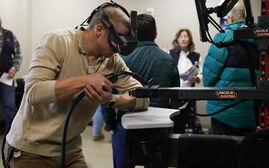Defense bill could mean more work for Maine shipbuilders and other contractors
 File photo
Provisions in a draft Department of Defense spending bill include authorization to spend $544 million for modernization efforts at Portsmouth Naval Shipyard in Kittery.
File photo
Provisions in a draft Department of Defense spending bill include authorization to spend $544 million for modernization efforts at Portsmouth Naval Shipyard in Kittery.
A draft defense spending bill that sailed through Congress last week would fund continued ship and infrastructure construction at Maine’s two major military shipyards, as well as research and development by small businesses and improved housing assistance for U.S. Coast Guard personnel.
The Fiscal Year 2024 National Defense Authorization Act passed the House (310-118) and Senate (87-13) and now goes to President Joe Biden for consideration.
“The legislation also supports good-paying jobs in Maine communities, particularly through its funding for shipbuilding at Bath Iron Works and Portsmouth Naval Shipyard,” said U.S. Sen. Angus King, I-Maine, a member of the Senate Armed Services and Intelligence committees and Veterans Affairs Committee, in a news release.
“These funds will help the shipyards plan their futures, continue to build the highest-quality ships, and maintain the submarine fleet that our Navy needs to accomplish missions across the globe.”
There are more than 12,000 military personnel in Maine. The $850 million they earn through their work “is an enormous driver for the state’s economy,” King wrote in an op-ed last week.
In addition, he wrote, Maine has large defense contractors such as Bath Iron Works and Pratt & Whitney and “hundreds of small businesses in Maine that are working on a contract basis to supply parts and machinery for our national defense” amounting to $3.6 billion worth of contract work statewide.
Military spending amounts to 4.3% of Maine’s gross domestic product.
The bill specifies funding for Bath Iron Works and Portsmouth Naval Shipyard, in Kittery. But exact amounts for other provisions haven’t been worked out yet, a spokesperson for King’s office told Mainebiz.
Last year, half of defense contracts in Maine went to supplies and equipment production, followed by services (25%), construction (24%) and research and development (1%).
Altogether, the act supports $841.4 billion in funding for the Defense Department.
Ships and jets
The bill authorizes two DDG-51 Arleigh Burke-class destroyers and $780 million advance procurement of an additional ship to be purchased next year, which Bath Iron Works can compete to build.
A subsidiary of aerospace and defense giant General Dynamics Corp. (NYSE: GD), BIW builds Arleigh Burke-class destroyers for the Navy.
Earlier this year, Bath Iron Works was awarded a contract worth $58 million to provide engineering and design work, logistical support, supply chain help and other services for the construction of Navy destroyers through December 2024.
At Portsmouth Naval Shipyard, the bill supports critical Maine National Guard facilities and authorizes $544 million in funding for modernization efforts, including the yard’s dry dock extension that will accommodate increased capacity to maintain the Navy’s submarine fleet. Last year, the shipyard was awarded $475 million in federal funding to modernize the dry dock.
Connecticut-based Pratt & Whitney, an RTX (NYSE: RTX) business that operates a plant in North Berwick, continues to receive support for engine upgrades for the military’s F135 fighter jet, selected earlier this year by the U.S. Air Force, U.S. Marine Corps and U.S. Navy for upgrades.
Pratt & Whitney provides nearly 55,000 jobs across 41 states and has more than 260 domestic suppliers. Its North Berwick plant employs over 2,100 people and covers more than 1 million square feet, making it the largest manufacturing facility under one roof in Maine.
R&D
The legislation supports Maine-driven research and development for training in the Arctic, considered an emerging frontier for international commerce and military capabilities required to protect national interests, which is expected to create new opportunities for the U.S., King has said.
Support for composites development and 3D printing are on tap. That sector includes the University of Maine’s Advanced Structures and Composites Center, which works on diverse technologies that include floating wind turbines and bulletproof shelters; and Compotech Inc., a high-tech defense manufacturing and tech company in Brewer that manufactures blast and ballistic-proof hardware, re-deployable shelters, and software solutions, with a concentration on artificial intelligence and machine learning in order to develop state-of-the-art protection solutions.
Mass timber and hypersonic technology were also among the bill’s provisions.
Mass timber is emerging as a construction alternative among a number of construction projects around the state, but for now the supply chain remains a challenge because there are no manufacturers of mass timber in the Northeast.
A Portland-based aerospace startup in hypersonic technology is HyperSpace Propulsion Inc., which recently signed a letter of intent for a contract to establish a manufacturing, operations and space flight center at the former Loring Air Force Base in Limestone.
The bill would provide money to the APEX Accelerators program, managed by the Department of Defense Office of Small Business Programs and designed to help small businesses obtain and navigate defense contracts. The program provides the education and training and is considered critical in the department’s efforts to identify and help businesses enter and participate in the defense supply-chain. APEX’s Maine headquarters is in Bangor and is administered by the Eastern Maine Development Corp.
Pay raise and housing
The legislation includes a 5.2% pay increase for military and civilian personnel, the highest pay raise in over 20 years for the military and over 40 years for civilians. The bill includes oversight on Department of Defense programs that support Coast Guard members, including how the department funds housing allowances and how it supports change of duty station moves.
The legislation also includes a King-led provision encouraging the DOD to focus America’s recruiting efforts on remote geographic areas lacking military infrastructure and presence.
And it provides the Maine National Guard funding from training and new infrastructure to operational deployments.














0 Comments